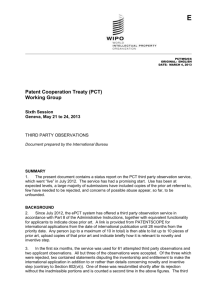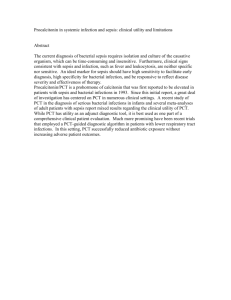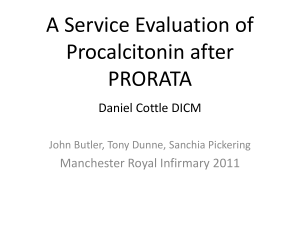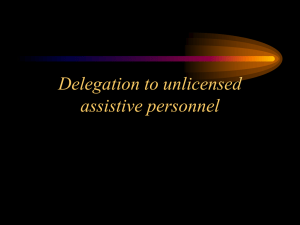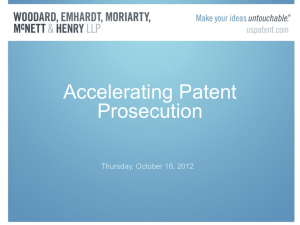Formal Integration of the Patent Prosecution Highway into
advertisement
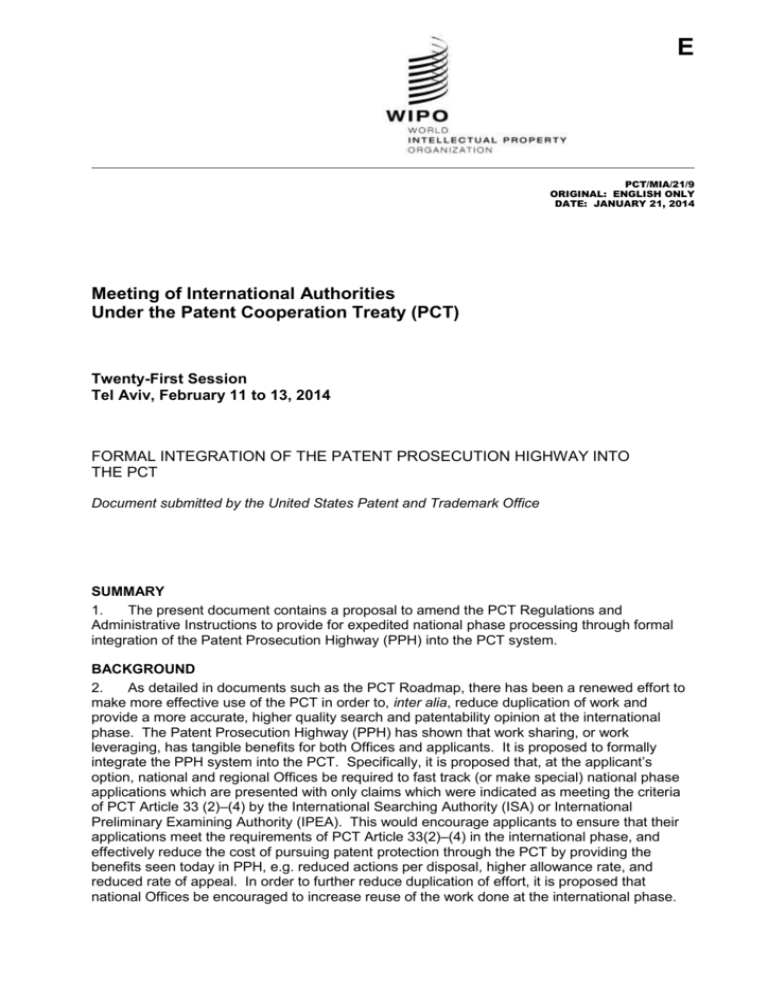
E PCT/MIA/21/9 ORIGINAL: ENGLISH ONLY DATE: JANUARY 21, 2014 Meeting of International Authorities Under the Patent Cooperation Treaty (PCT) Twenty-First Session Tel Aviv, February 11 to 13, 2014 FORMAL INTEGRATION OF THE PATENT PROSECUTION HIGHWAY INTO THE PCT Document submitted by the United States Patent and Trademark Office SUMMARY 1. The present document contains a proposal to amend the PCT Regulations and Administrative Instructions to provide for expedited national phase processing through formal integration of the Patent Prosecution Highway (PPH) into the PCT system. BACKGROUND 2. As detailed in documents such as the PCT Roadmap, there has been a renewed effort to make more effective use of the PCT in order to, inter alia, reduce duplication of work and provide a more accurate, higher quality search and patentability opinion at the international phase. The Patent Prosecution Highway (PPH) has shown that work sharing, or work leveraging, has tangible benefits for both Offices and applicants. It is proposed to formally integrate the PPH system into the PCT. Specifically, it is proposed that, at the applicant’s option, national and regional Offices be required to fast track (or make special) national phase applications which are presented with only claims which were indicated as meeting the criteria of PCT Article 33 (2)–(4) by the International Searching Authority (ISA) or International Preliminary Examining Authority (IPEA). This would encourage applicants to ensure that their applications meet the requirements of PCT Article 33(2)–(4) in the international phase, and effectively reduce the cost of pursuing patent protection through the PCT by providing the benefits seen today in PPH, e.g. reduced actions per disposal, higher allowance rate, and reduced rate of appeal. In order to further reduce duplication of effort, it is proposed that national Offices be encouraged to increase reuse of the work done at the international phase. PCT/MIA/21/9 page 2 3. Under the PPH program, an applicant receiving a favorable written opinion or international preliminary report on patentability (IPRP) from an International Authority would be able to request that a corresponding national phase entry or a national application receive expedited processing and examination provided that all claims in the national phase application sufficiently correspond to the claims which received a positive indication in the written opinion or IPRP. The national Office would then use the international phase work products to streamline patent processing. 4. To date, the PPH has been shown to provide benefits for Offices and applicants alike. Specifically, the PPH has been shown to significantly speed up the examination process for corresponding applications filed in participating countries by allowing examiners to reuse search and examination results. The reuse of search and examination results is carried out while respecting the national sovereignty of the participating Offices, since a search and examination of the application continues to be performed by each Office according to its national laws, and no deference is given to the patentability determinations reached by other Offices. Some of the proven benefits of the PPH include: accelerated examination, a significantly higher allowance rate, a decreased cost of prosecution resulting from the fact that PPH cases generally have fewer actions prior to allowance, and reduced pendency. The quality of the patents granted under the PPH is not compromised, and may be enhanced by giving the examiner a better starting point for their search and examination. Since every Office participating in the PPH carries out a search and examination according to its national laws, the quality of the granted patents is at least as high as that of the patents granted in those Offices outside of the PPH. 5. Regarding the efficiency benefits to the Offices, the U.S. has experienced the following1: Allowance Rate: PPH – 86% PCT-PPH – 88% All applications – 53% First Action Allowance Rate: PPH – 25.7% PCT-PPH – 19.3% All applications – 15.2% Average Pendency to First Action: PPH – 5.8 months PCT-PPH – 5.6 months All applications – 18.8 months Average Pendency to Final Decision: PPH – 11.4 months PCT-PPH – 9.9 All applications – 30.7 months 6. Similar data for other PPH participating Offices can be found at: http://www.jpo.go.jp/ppph-portal/statistics.htm 7. Currently, all but two of the International Authorities as well as a large number of non-Authorities have entered into PPH agreements with at least one other national or regional Office. The result is that there is an ever growing number of bilateral PPH agreements in force worldwide. By formally incorporating the PPH into the PCT system, the need for many of these separate agreements could be eliminated. Further, the requirements for receiving PPH 1 Data for January 2013 – June 2013 (http://www.jpo.go.jp/ppph-portal/statistics.htm) PCT/MIA/21/9 page 3 treatment before a given Office can differ from one PPH agreement to another. Adoption of the proposal to formally integrate the PPH into the PCT would, therefore, have the added benefit of standardizing many of these requirements, and thus simplifying the process for applicants. INTEGRATION OF THE PPH INTO THE PCT 8. At the fifth session of the PCT Working Group, held in Geneva from May 29 to June 1, 2012, the United Kingdom and the United States of America presented a joint proposal entitled “PCT 20/20”, containing 12 proposals for further improvement of the PCT system (document PCT/WG/5/18). The joint PCT 20/20 proposal included a specific proposal for “Formal Integration of the Patent Prosecution Highway Into the PCT, Fast Track of National Phase Applications, Improve Reuse of PCT Work at the National Phase.” 9. Taking into account the discussions and the comments received during the fifth session of the Working Group, the United Kingdom and the United States of America prepared revised versions of the original proposals which were communicated by the International Bureau, by way of a Circular (Circular C. PCT 1364, dated December 20, 2012, Annex I), to Offices of all PCT Contracting States in their capacity as a receiving Office, an International Searching and Preliminary Examining Authority and/or a designated and elected Office under the PCT, to Geneva-based missions and foreign ministries of PCT Contracting States and of States that are invited to attend meetings of the PCT Working Group as observers, as well as to certain organizations that are invited to attend meetings of the PCT Working Group as observers. The revised and expanded proposal contained in Circular C. PCT 1364 was also discussed at the twentieth session of the Meeting of International Authorities under the Patent Cooperation Treaty (PCT/MIA), held in Munich from February 6 to 8, 2013. 10. The revised and expanded proposal included specific proposals to amend the PCT Regulations to include new Rules 52bis and 78bis which specifically provide for PPH treatment for applications entering the national phase under certain conditions. 11. With regard to the specific discussions at the MIA, a summary of those discussions is set forth in paragraphs 52 to 102 of the Annex to Document PCT/WG/6/3 (“the MIA Report”). In particular, it is noted in paragraph 83 that “Authorities expressed general support for the proposal” and in paragraph 101 that “there was particular interest and hope for fast progress in the PCT Working Group” on several items, including the formal integration of the PPH into the PCT system. DISCUSSIONS AT THE SIXTH SESSION OF THE PCT WORKING GROUP 12. In view of the indication from International Authorities of interest and hope for fast progress in the PCT Working Group for the proposal, the United Kingdom and the United States of America prepared a further revised version of the proposal to formally integrate the PPH into the PCT, taking into account the responses to the Circular and the discussions from the MIA, for presentation to the sixth session of the PCT Working Group which was held in Geneva from May 21 to 24, 2013. 13. A general summary of the discussions from the Working Group is set forth in paragraphs 23 to 28 of document PCT/WG/6/23 (Summary by the Chair), and a detailed account is presented in paragraphs 102 to 126 of document PCT/WG/6/24 (“the Working Group Report”). 14. While some concerns were raised, the majority of the delegations which took the floor indicated support for the proposal and indicated a willingness to consider proposals directed to overcoming the stated concerns or, in the alternative, indicated that they would take advantage of the proposed notice of incompatibility. Two delegations indicated outright opposition to the proposal. PCT/MIA/21/9 page 4 15. Specifically, the two delegations which opposed the proposal outright raised concerns with respect to the “possible impact on Offices in terms of cost relating to human and technological resources,” regarding “comparative benefits,” with respect to the ability of “all International Authorities to ensure they were able to deliver work of consistent and reasonably-uniform quality,” that the PPH encouraged “the reuse of work done in the international phase without undertaking further examination of the application in the national phase,” regarding the position that “by granting patents hastily by accelerating the examination process and thereby reducing the pendency times, the consistency in the quality of patents could be compromised,” and finally that “membership of the PPH was voluntary and it should not be binding on other countries to accept an international report for the sake of accelerating the examination process.” However, the largest obstacle seemed to be related to one delegation’s position that the incorporation of the PPH into the PCT “was a substantive change to the nature of Treaty, [and] that an amendment to the Regulations would not suffice, nor would it be legally correct, as the substantive activities of Offices in the national phase would be affected.” That delegation indicated that it was their position that, “in order to implement the integration of the PPH into the PCT, it was therefore necessary to convene a diplomatic conference under the procedure in Article 60.” (See paragraphs 104 and 105 of the Working Group Report.) 16. The U.S. Delegation responded to the comments made by the member States, including those comments, by pointing out that, under the PPH, an application which met the requirements would merely “be advanced and examined out of turn…[but] the remainder of the examination procedure would not be affected in any way.” It is the opinion of the United States Patent and Trademark Office (USPTO) that this would address the stated concerns with respect to any possible compromise in the quality of patents issued under the proposal, in that any national office would still subject the national stage application to a full examination. The U.S. Delegation also pointed out that the proposal provided for an “opt out” in the form of notice of incompatibility provisions in Rules 52bis.1(b) and 78bis.1(b). It is the position of the USPTO that any Office which had concerns regarding resource impacts, comparative benefits, and the quality of the international stage work product could take advantage of the incompatibility provisions until such time as that Office was satisfied that such issues had been addressed. Finally, concerning the assertion that the proposal was ultra vires to the Articles of the Treaty, the U.S. Delegation indicated that it disagreed with such a position, and invited the delegation to specifically point out which Articles of the Treaty it considered the proposal to violate. It also “requested the Secretariat to provide some objective thought on this matter” (see paragraph 115 of the Working Group Report). 17. In response, the delegation did not indicate any specific Articles which it felt the proposal violated (see paragraph 117 of the Working Group Report). Further, the International Bureau, while indicating that whether or not a diplomatic conference would be necessary was ultimately a question that “would need to be determined by Member States,” did indicate that it was of the opinion that the proposal appeared to advance the exact purpose of the Treaty from its inception. Specifically, the Secretariat stated that “one of the principles behind the PCT was for Offices to benefit from an international search and optionally an international preliminary examination when examining a patent application under its national laws. In other words, a national Office could take advantage of previous non-binding work produced in the international phase, rather than searching and examining an application from scratch. The PPH had a similar basic idea to this principle in that previous work was taken into account by providing applicants meeting certain requirements with a head start when processing their applications.” The Secretariat went on to state that “the PPH did not propose to change the non-binding character of work performed in the international phase; on the contrary, Offices applying PPH agreements conducted a full substantive search and examination under their respective national laws taking into account the results from the Office of first examination. Therefore, as there was no change in the PCT system beyond the accelerated processing of certain applications in the national phase, the Secretariat did not consider this to be a dramatic change in the nature of the PCT to require amendment to the Treaty itself” (see paragraph 116 of the Working Group report). PCT/MIA/21/9 page 5 18. As indicated above a number of Offices indicated both support for the proposal and a willingness to consider proposals directed to overcoming specific concerns. Among the issues raised by those Offices were, providing for temporary suspension to address workload issues, making it clear that the requirements set forth in the Regulations and Administrative Instructions were minimum requirements, clarifying what was meant by the phrase "prior to the start of processing," clarification of the status of comments made in Box VIII of the written opinion or IPER, and clarification that an applicant could not rely on a positive international search report alone to request PPH status. PROPOSAL 19. Annexes I and II of this document contain specific proposals to amend the PCT Regulations and Administrative Instructions to formally integrate the PPH into the PCT system. The proposals contained in the Annexes have been amended in an attempt to address the concerns discussed in paragraph 18 above. 20. In addition to the issues raised at the PCT Working Group meeting, the European Patent Office (EPO) approached the USPTO with the additional suggestion that the “opt out” provisions of Rules 52bis.1(b) and 78bis.1(b) be changed to “opt in” provisions whereby an Office would only offer PPH benefits for a national stage application where they had notified the International Bureau of that fact. 21. In response to the EPO suggestion, the USPTO has included alternative language for Rules 52bis.1(b) and 78bis.1(b) in brackets for the purposes of discussion by the MIA. While the USPTO has included such alternative language, it would prefer to keep the provisions as previously proposed for several reasons. First, to our knowledge, there is no other “opt in” type provision anywhere else within the Treaty. All such provisions are presented as being at an Office’s option only in situations where it conflicts with the provisions of that Office’s national laws. Further, presenting the proposal as an “opt in” provision removes the sense of obligation implied by a notice of incompatibility. In other words, in situations where a notice of incompatibility provision is presented, there is an implication that the provision is required to be performed under the Treaty and that any Office taking advantage of the notice of incompatibility understands this obligation and is working to amend their national laws to allow them to carry out the said obligation. 22. As the International Authorities consider the proposals contained in the Annexes to this document, the following points should be kept in mind: Integration of the PPH into the PCT system would not affect national sovereignty, and in no way provides for an automatic or mandatory grant of a patent. The final determination of whether patent rights are ultimately granted is still left entirely to the national/regional Office concerned. Any national sovereignty concerns are also addressed through the provision of a notice of incompatibility in the Rules. The PPH in no way affects the quality of the national phase examination or the quality of any patents issued. Under the proposal, the national Office merely uses the international phase work products to streamline its own patent processing. National Offices would make a determination as to patentability under their respective national laws taking into account the results of the international stage work product. As such, there would be no change in the PCT system beyond the accelerated processing of certain applications in the national phase. PCT/MIA/21/9 page 6 Formal integration would allow applicants from all member countries to take advantage of the benefits of PPH worldwide regardless of whether their own national Office has entered into a bilateral agreement with another national Office. The proposal would also benefit the national offices by providing a mechanism which would assist the Offices in their efforts to reduce any current backlogs of applications. The International Bureau has stated that it does not consider this proposal to be a dramatic change in the nature of the PCT and that implementation would not require the convening of a Diplomatic Conference in order to amend the Treaty itself. 23. The Meeting is invited to consider and comment on the revised proposals contained in the Annexes to this document, and any Authority which considers the proposal to be ultra vires to the Treaty is requested to specifically identify which Articles of the Treaty the proposal violates. [Annexes follow] PCT/MIA/21/9 ANNEX I PROPOSED AMENDMENTS TO THE PCT REGULATIONS2 TABLE OF CONTENTS Rule 52bis Expedited Processing and Examination Before the Designated Office.................... 2 Rule 52bis.1 Request and Requirements ........................................................................... 2 Rule 78bis Expedited Processing and Examination Before the Elected Office .......................... 4 Rule 78bis.1 Request and Requirements .......................................................................... 4 2 Proposed additions and deletions are indicated, respectively, by underlining and striking through the text concerned. Certain provisions that are not proposed to be amended may be included for ease of reference. PCT/MIA/21/9 Annex I, page 2 Rule 52bis Expedited Processing and Examination Before the Designated Office Rule 52bis.1 Request and Requirements (a) At the request of applicant, any application which contains or is amended to contain, [prior to the start of processing by the designated Office], only claims which sufficiently correspond to claims which were indicated as meeting the criteria of PCT Article 33 (2)–(4) in the Written Opinion of the International Searching Authority, and which otherwise satisfies the criteria as set forth in the Administrative Instructions, shall receive expedited processing and examination as defined in the Administrative Instructions. [(b) If, on […], paragraph (a) is not compatible with the national law applied by the designated Office, those paragraphs shall not apply in respect of that Office for as long as they continue not to be compatible with that law, provided that the said Office informs the International Bureau accordingly by […]. The information received shall be promptly published by the International Bureau in the Gazette.] [(b) Any designated Office which provides expedited processing and examination in accordance with paragraph (a) shall inform the International Bureau accordingly, and the information received shall be promptly published by the International Bureau in the Gazette.] (c) Any designated Office which provides expedited processing and examination in accordance with paragraph (a) may temporarily suspend offering such as it deems necessary (e.g., for the purposes of workload control, etc.), provided that the said Office informs the International Bureau accordingly including an indication of the period of time the Office expects the suspension to last. The information received shall be promptly published by the International Bureau in the Gazette. PCT/MIA/21/9 Annex I, page 3 Comment 1: The phrase “prior to the start of processing by the designated Office” in paragraph (a) has been set off by brackets in view of a comment made by the Delegation of Australia at the Working Group (see paragraph 109 of the Working Group Report). The phrase was chosen in an attempt to provide flexibility to, and thus facilitate implementation by, the Offices. However, the USPTO is willing to consider alternatives that would achieve the aim of requiring any amendments to the claims needed to be made to qualify for expedited processing to be submitted before the designated Office had started search and examination of the application, and we invite International Authorities to suggest alternative language. Comment 2: The alternative options for paragraph (b) are presented for consideration in accordance with the discussion in paragraphs 20 and 21. PCT/MIA/21/9 Annex I, page 4 Rule 78bis Expedited Processing and Examination Before the Elected Office Rule 78bis.1 Request and Requirements (a) At the request of applicant, any application which contains or is amended to contain, [prior to the start of processing by the elected Office], only claims which sufficiently correspond to claims which were indicated as meeting the criteria of PCT Article 33 (2)–(4) in the Written Opinion of the International Preliminary Examining Authority or the International Preliminary Examination Report, and which otherwise satisfies the criteria as set forth in the Administrative Instructions, shall receive expedited processing and examination as defined in the Administrative Instructions. [(b) If, on […], paragraph (a) is not compatible with the national law applied by the elected Office, those paragraphs shall not apply in respect of that Office for as long as they continue not to be compatible with that law, provided that the said Office informs the International Bureau accordingly by […]. The information received shall be promptly published by the International Bureau in the Gazette.] [(b) Any elected Office which offers expedited processing and examination in accordance with paragraph (a) shall inform the International Bureau accordingly, and the information received shall be promptly published by the International Bureau in the Gazette.] (c) Any elected Office which provides expedited processing and examination in accordance with paragraph (a) may temporarily suspend offering such as it deems necessary (e.g., for the purposes of workload control, etc.), provided that the said Office informs the International Bureau accordingly including an indication of the period of time the Office expects the suspension to last. The information received shall be promptly published by the International Bureau in the Gazette. PCT/MIA/21/9 Annex I, page 5 Comment 1: The phrase “prior to the start of processing by the elected Office” in paragraph (a) has been set off by brackets in view of a comment made by the Delegation of Australia at the Working Group (see paragraph 109 of the Working Group Report). The phrase was chosen in an attempt to provide flexibility to, and thus facilitate implementation by, the Offices. However, the USPTO is willing to consider alternatives that would achieve the aim of requiring any amendments to the claims needed to be made to qualify for expedited processing to be submitted before the elected Office had started search and examination of the application, and we invite International Authorities to suggest alternative language. Comment 2: The alternative options for paragraph (b) are presented for consideration in accordance with the discussion in paragraphs 20 and 21. [Annex II follows] PCT/MIA/21/9 ANNEX II PROPOSED AMENDMENTS TO THE ADMINSISTRATIVE INSTRUCTIONS3 PART 9 INSTRUCTIONS RELATING TO EXPEDITED NATIONAL PHASE PROCESSING UNDER PCT RULES 52BIS OR 78BIS Section 901 Requirements for Expedited Processing (a) Pursuant to Rules 52bis and 78bis, a national or regional phase application filed under Article 22 or 39 shall receive expedited processing and examination by the designated or elected Office in accordance with Section 903 paragraph (a), provided that: (i) the most recent of the written opinion of the International Searching Authority under Rule 43bis.1, the written opinion of the International Preliminary Examining Authority under Rule 66.2, and the international preliminary examination report under Rule 70 indicates at least one claim in the international application as having novelty, inventive step and industrial applicability as set forth in PCT Article 33(2), 33(3) and 33(4), respectively, provided that such expedited processing and examination shall not be accorded on the basis of the international search report alone; (ii) all of the claims in the national or regional phase application must sufficiently correspond or be amended to sufficiently correspond to one or more of those claims indicated as having novelty, inventive step and industrial applicability in the opinion or report in subparagraph (i). A claim in the national or regional phase application is considered to sufficiently correspond where such claim, accounting for differences due to translations and claim formatting requirements, has a scope equal or similar to, or narrower than that of a claim 3 Proposed additions and deletions are indicated, respectively, by underlining and striking through the text concerned. Certain provisions that are not proposed to be amended may be included for ease of reference. PCT/MIA/21/9 Annex II, page 2 [Section 901, continued] indicated as having novelty, inventive step, and industrial applicability in the opinion or report in subparagraph (i); (iii) all of the claims in the opinion or report in subparagraph (i) which are relied upon for correspondence in subparagraph (ii) must be free of any observations in Box VIII of such opinion or report; (iv) substantive examination of the national or regional phase application has not yet begun; and (v) the applicant has submitted a formal request for expedited processing and examination under this Section. (b) A claim that is narrower in scope under subparagraph (ii) occurs when a claim indicated as having novelty, inventive step and industrial applicability in the most recent work product of the corresponding international application is amended to be further limited by an additional feature that is supported in the written description of the national or regional phase application. The claim(s) with the narrower scope must be written in dependent form in the national or regional phase application. PCT/MIA/21/9 Annex II, page 3 Section 902 Optional Requirements for Expedited Processing The designated or elected Office may also require any of the following: (i) the use of a specific form to request expedited processing; (ii) a fee; (iii) a copy of the opinion or report in Section 901 subparagraph (i) and a translation thereof, unless such opinion or report is immediately available to the designated or elected Office in a language accepted by the designated or elected Office; (iv) a copy of the claims from the international application which were indicated as having novelty, inventive step and industrial applicability and a translation thereof, unless such claims are immediately available to the designated or elected Office in a language accepted by the designated or elected Office; (v) a claims correspondence table in a language accepted by the designated or elected Office, indicating how all of the claims in the national or regional phase application sufficiently correspond to the claims indicated as having novelty, inventive step and industrial applicability in the opinion or report in Section 901 subparagraph (i); (vi) a statement certifying that all of the claims in the national or regional application sufficiently correspond to the claims indicated as having novelty, inventive step and industrial applicability in the opinion or report in Section 901 subparagraph (i); PCT/MIA/21/9 Annex II, page 4 [Section 902, continued] (vii) a list of all documents cited in every opinion or report in Section 901 subparagraph (i) along with copies of such documents, unless such copies were previously submitted in the national or regional phase application or were published by the designated or elected Office; and (viii) that the submission of any items under this Part is to be made by electronic means. PCT/MIA/21/9 Annex II, page 5 Section 903 Expedited Processing (a) A national or regional phase application which satisfies the requirements set forth in Sections 901 and 902 shall be accorded special status by the designated or elected Office, such that the application is advanced out of turn for examination. Subsequent to the initial action on the merits by the designated or elected Office, the application may retain its special status throughout its prosecution at the option of the designated or elected Office. (b) In the event that applicant’s initial request under this Part is defective, the designated or elected Office shall give applicant at least one opportunity to perfect the request. (c) Where the national law provides for requirements or for expedited processing which, from the viewpoint of applicants, are more favorable than the requirements or processing provided for by this Part in respect of national applications, the national Office may apply those more favorable requirements or provide such more favorable processing. [End of Annex II and of document]
